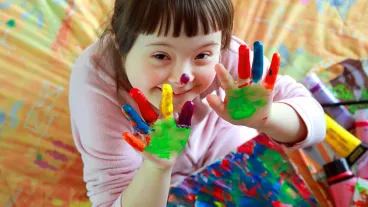Lived experience of people with disabilities
Shaping policy and practice
October 2020
Patsie Frawley
This is the second short article in a series focusing on disability in Australia, including best-practice evidence for particular areas of policy and practice. This article discusses the evidence underpinning the engagement of people with disability in policy and service development, and briefly outlines how this can be implemented.
Introduction
Australians with disabilities have traditionally struggled to have their voices heard and their diversity of experiences reflected in public policy.1 As a signatory to the UN Convention on the Rights of Persons with Disabilities, Australia’s disability legislation, policy and practice must reflect that people with disabilities have a right to participate in the development of policy and practices that impact their lives. However, there are a range of barriers to the meaningful engagement of people with disabilities as ‘experts by experience’, including attitudinal barriers.2,3 This short article outlines the evidence on engaging with people with disabilities and their lived experiences in policy design, and highlights what works to ensure genuine participation for people with disability.
What is lived experience?
Lived experience is ‘people’s experiences, [and] how people live through and respond to those experiences’.4 The term comes from qualitative research methods, where knowledge is sought through engaging with people’s accounts of their experiences.5
In social policy, lived experience is increasingly used to ‘frame user involvement in service improvement’.6 It is a mechanism for participatory democracy, giving marginalised groups genuine opportunities to contribute to policy making through the expertise of their lived experience.
Why incorporate lived experience in policy and services for people with disability?
The lived experiences of Australians with disability is diverse; however, these experiences have not always been well represented in disability policy.7,8,9 Approaches to policy development that include people with lived experience of disability through a process of co-design acknowledge this diversity and work towards creating responses that are informed by these experiences.10 Policy making that has people with disabilities at the table is not only beneficial to the policy outcome; the process itself can have an impact on social inclusion – uniting and empowering people with disabilities and those they collaborate with. People with disabilities also benefit, with evidence suggesting that people with disabilities who have been involved in participatory policy making build skills, knowledge, confidence and a sense of worth.11
How can people with disabilities be supported to participate in service and policy design?
Participating in service and policy design is a formal way for people with disabilities to share their lived experiences. The UN Convention on the Rights of Persons with Disabilities is one place to look for guidance on how and in what kind of policy making forums people with disabilities should be participating. Article 4(3) outlines that the obligation for the participation of people with disabilities is not negotiable and the scope of their participation is broad. It includes their participation in the development and implementation of legislation, disability and mainstream policy and services, and public policy.
Attitudes held by organisations that ought to be including people with disability in policy making are a key factor in determining whether people with disabilities are included and how they are included.12 Research has shown collegial and practical support are key factors that affect the meaningful participation of people with disabilities in these structures.13 Some key questions to ask are:
- How accessible is the decision-making environment for people with varied needs (e.g. plain language information, time for discussion of issues, information provided in different formats)?
- What practical support may be necessary (e.g. reimbursement of costs for travel and time, provision of personal care, sign language interpreters)?14
The Self Advocacy Resource Unit (Victoria) has co-developed a resource to support the involvement of people with cognitive disabilities on boards, committees and advisory groups.15 The guide provides information and resources on concepts such as: understanding consumer participation; being prepared; defining the role; helping everyone understand; giving everyone a say; and evaluation.
Conclusion
As a signatory to the UN Convention on the Rights of Persons with Disabilities, Australia endorses the participation of all people with disabilities in decisions that impact their lives. Research shows that incorporating lived experience in policy and service design is beneficial to people with disabilities, improves service accessibility, empowers Australians with disabilities and delivers better services.
Related resources and further information
- Voice at the Table
This co-developed project provides resources for use by people with disabilities and organisations engaging them in policy, service and research development. - Walking the Talk
This framework provides a comprehensive overview of principles and practices for engaging with people with disabilities and their families in service and policy development. - First Peoples Disability Network
Governed by First Peoples with lived experience of disability, this website provides resources to government, the community and researchers on work relating to First Peoples with disabilities. - Our Site
This website provides resources co-developed by women with disabilities. The ‘Lead and Take Part’ section covers leadership, politics and activism, boards and committees.
1 Frawley, P., & Bigby, C. (2011). Inclusion in political and public life: The experiences of people with intellectual disability on government disability advisory bodies in Australia. Journal of Intellectual & Developmental Disability, 36(1), 27–38.
2 Stancliffe, R. J. (2014). Inclusion of adults with disability in Australia: Outcomes, legislation and issues. International Journal of Inclusive Education, 18(10), 1053–1063. doi: 10.1080/13603116.2012.693395
3 Social Ventures Australia. (2019). SVA perspectives: Disability. Sydney: Social Ventures Australia.Retrieved from www.socialventures.com.au/assets/SVA-Disability-Perspective-Paper.pdf
4 Boylorn, R. M. (2008). Lived experience. In L. M. Given (Ed.), The Sage encyclopedia of qualitative research methods, Vol. 2 (p. 490). Thousand Oaks, CA: Sage.
5 Boylorn, R. M. (2008). Lived experience. In L. M. Given (Ed.), The Sage encyclopedia of qualitative research methods, Vol. 2 (p. 490). Thousand Oaks, CA: Sage.
6 McIntosh, I., & Wright, S. (2019). Exploring what the notion of ‘lived experience’ offers for social policy analysis. Journal of Social Policy, 28(3), 450.
7 Goodley, D. (2013). Dis/entangling critical disability studies. Disability & Society, 28, 631–44.
8 Goodley, D. (2016). Disability studies: An interdisciplinary introduction (2nd ed.). London: Sage.
9 Frawley, P., & Bigby, C. (2011). Inclusion in political and public life: The experiences of people with intellectual disability on government disability advisory bodies in Australia. Journal of Intellectual & Developmental Disability, 36(1), 27–38.
10 Social Ventures Australia. (2019). SVA perspectives: Disability. Sydney: Social Ventures Australia.Retrieved from www.socialventures.com.au/assets/SVA-Disability-Perspective-Paper.pdf
11 Frawley, P., & Bigby, C. (2011). Inclusion in political and public life: The experiences of people with intellectual disability on government disability advisory bodies in Australia. Journal of Intellectual & Developmental Disability, 36(1), 27–38.
12 Frawley, P., & Bigby, C. (2011). Inclusion in political and public life: The experiences of people with intellectual disability on government disability advisory bodies in Australia. Journal of Intellectual & Developmental Disability, 36(1), 27–38.
13 Frawley, P., & Bigby, C. (2011). Inclusion in political and public life: The experiences of people with intellectual disability on government disability advisory bodies in Australia. Journal of Intellectual & Developmental Disability, 36(1), 27–38.
14 Social Ventures Australia. (2019). SVA perspectives: Disability. Sydney: Social Ventures Australia.Retrieved from www.socialventures.com.au/assets/SVA-Disability-Perspective-Paper.pdf
15 Self Advocacy Resource Unit. (2018). Voice at the table: Top ten tips. Melbourne: Self Advocacy Resource Unit. Retrieved from www.voicestogether.com.au/wp-content/uploads/2019/02/VATT-Top-10-Tips.pdf
© GettyImages/FG Trade
Related publications

Practices that support parenting by parents with…
This short article outlines the challenges faced by Australian parents with intellectual disability and best practice…
Read more
Children with disability: Inclusive practice and child-safe…
This webinar focused on developing practical strategies to create safe and inclusive environments for children with…
Read more
Victims of circumstance: Disability services in rural and…
What are some solutions to providing accessible services for people with disabilities living in rural and remote areas…
Read more